Key takeaways
- Campaign finance laws aim to maintain fairness in elections through contribution limits and disclosure requirements, but loopholes and complexities often undermine these goals.
- The distinction between PACs and Super PACs significantly impacts campaign financing, as Super PACs can raise unlimited funds, creating challenges for equitable competition.
- Transparency in financial reporting is crucial, yet the complexity of compliance can favor well-funded campaigns over smaller ones, leading to potential inequities.
- Staying organized and informed about campaign finance laws is vital for building trust and maintaining compliance, especially for less-resourced campaigns.
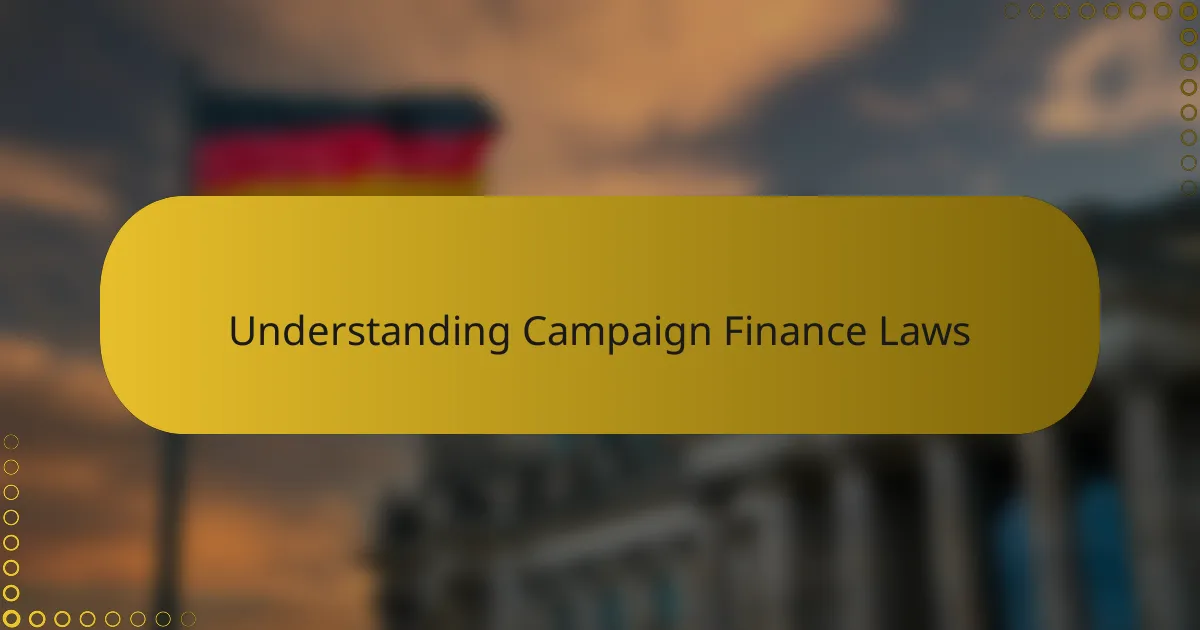
Understanding Campaign Finance Laws
Campaign finance laws can feel like a maze at first. I remember diving into the topic and realizing it’s not just about who gives money but how much, when, and under what conditions. Isn’t it surprising how these rules shape the very foundation of our elections?
One thing that stood out to me is the complexity of contribution limits and disclosure requirements. It’s easy to assume that money flows freely in politics, but these laws are designed to keep some balance. Still, I often wonder: do they really level the playing field or just create new loopholes?
What really hit home was understanding the role of Political Action Committees (PACs) and Super PACs. The distinctions between them aren’t just legal jargon—they impact how campaigns operate behind the scenes. When I first grasped that, it made me see campaign finance in a whole new light, as a system that’s both intricate and influential.
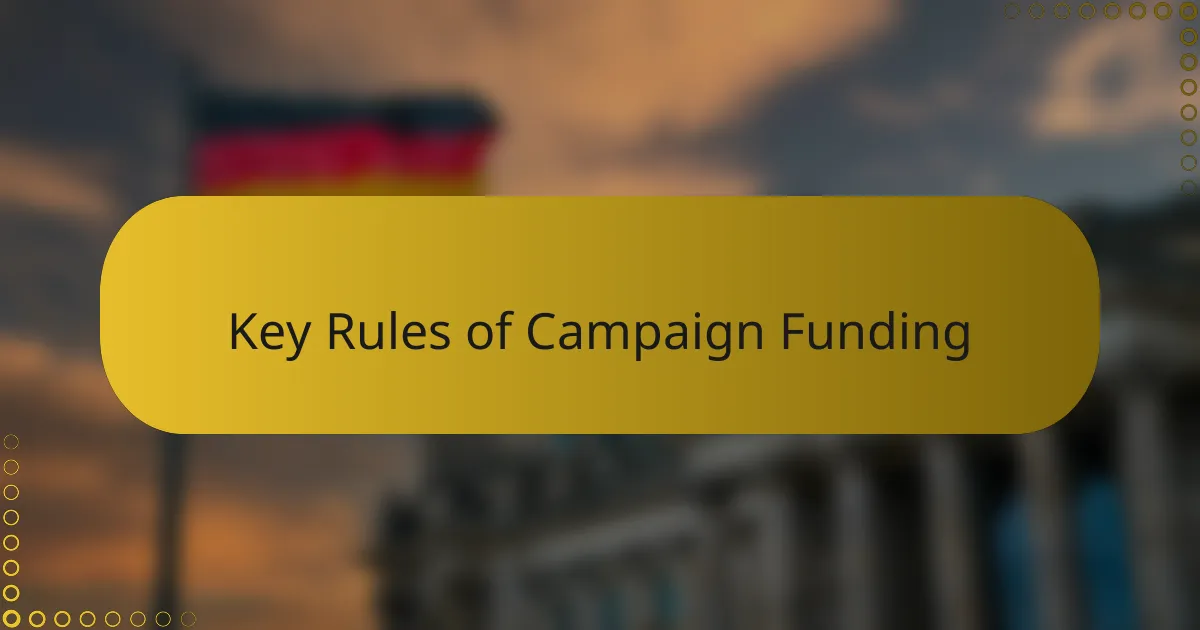
Key Rules of Campaign Funding
The first rule that caught my attention is the strict limits on how much individuals and organizations can contribute directly to candidates. At first, I thought these caps were just arbitrary numbers, but then I realized they’re meant to prevent any single donor from having too much sway. Still, it makes me wonder—is setting a dollar limit enough to ensure fairness, or does money just find a way around these boundaries?
Another key rule revolves around transparency. Campaigns have to disclose who’s funding them and how much, which sounds straightforward but gets complicated fast. I found myself digging through endless reports, realizing that these disclosures are crucial for accountability—even if, in practice, some donors stay hidden behind layers of groups.
Finally, I was struck by the nuances between what PACs and Super PACs can do. Regular PACs have contribution limits and direct coordination rules, but Super PACs? They can raise unlimited funds and spend big, as long as they don’t coordinate with candidates. This loophole felt like a loophole—yet, it’s part of the legal fabric. How does this affect the idea of elections being a fair fight? It’s a question I keep circling back to.
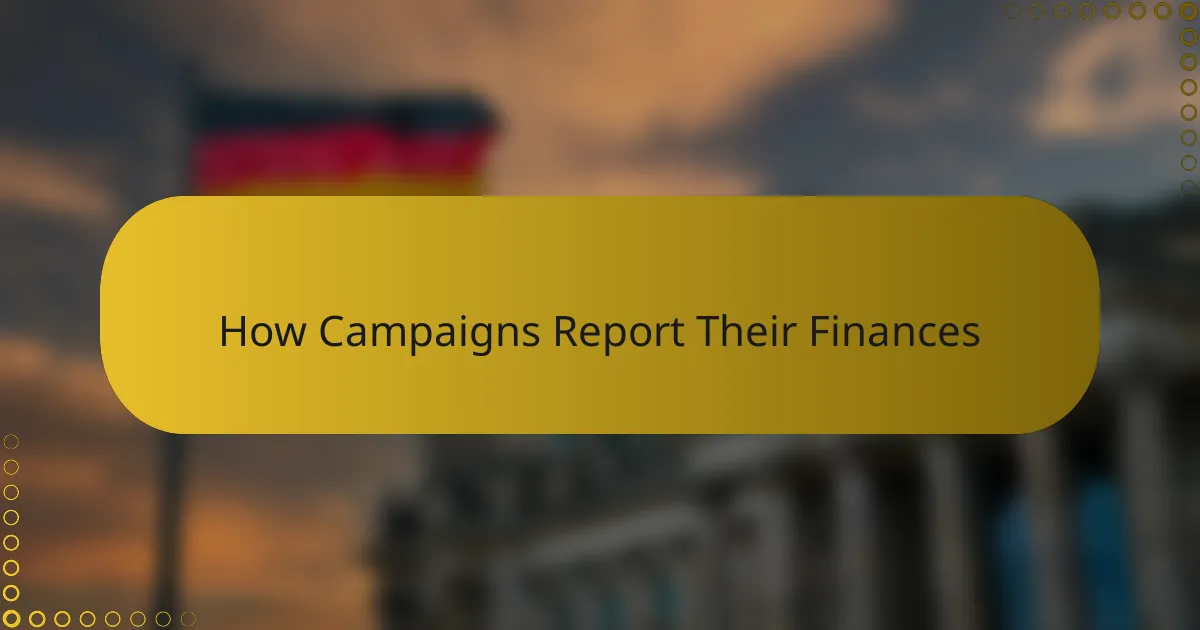
How Campaigns Report Their Finances
When I first looked into how campaigns report their finances, I was struck by the sheer volume of paperwork involved. Campaigns must file detailed reports with the Federal Election Commission (FEC), showing who donated, how much, and where the money went. It’s a lot like balancing a checkbook, but on a political scale—and it made me appreciate the importance of transparency in keeping campaigns accountable.
What puzzled me, though, was how frequently these reports had to be submitted. Some reports come in monthly, others quarterly, and close to election day, the filings are even more frequent. I started asking myself: how do campaigns keep up with this, especially smaller ones without big staffs? It’s clear these rules are meant to keep the public informed, but I wonder if the complexity sometimes helps insiders more than outsiders.
One thing I found reassuring is that these reports are public records, accessible online for anyone curious. That means voters like you and me can actually dig into where the money flows. For me, this was a big eye-opener—it turns campaign finance from an abstract concept into something real and traceable, like following a political paper trail. Have you ever tried looking up a candidate’s filings? It might just change how you see their campaign.
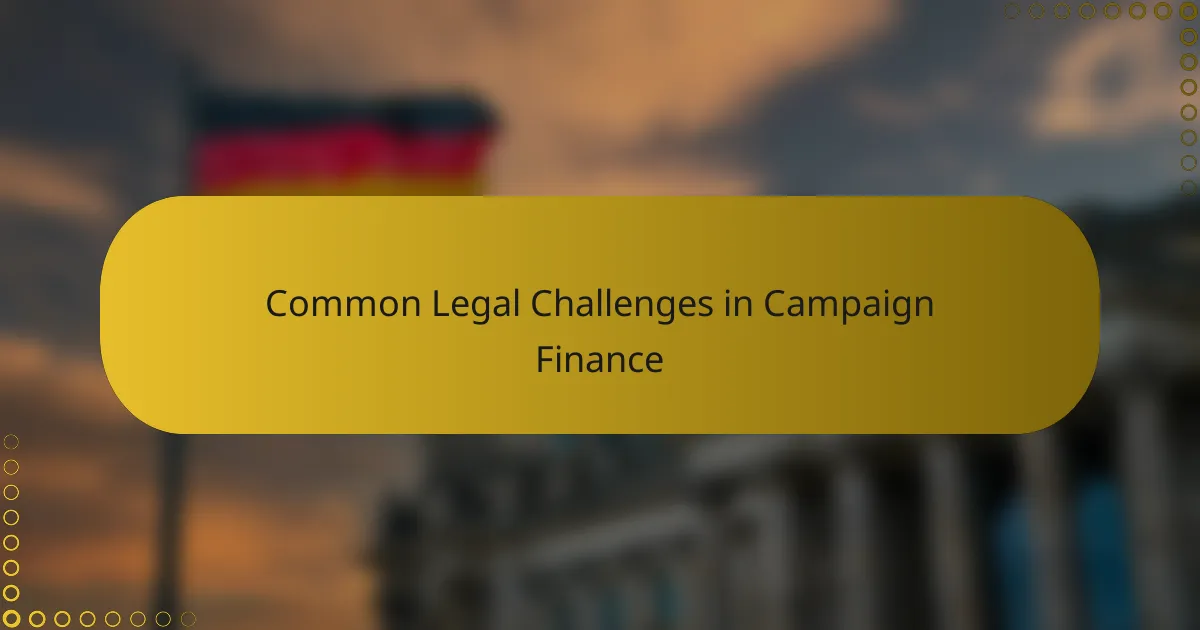
Common Legal Challenges in Campaign Finance
One of the biggest legal headaches in campaign finance stems from the blurry lines between what’s allowed and what isn’t. I remember feeling frustrated trying to untangle cases where candidates were accused of coordinating with Super PACs—something technically forbidden but often suspected. It makes me question, how clear can these rules really be when interpretation depends so much on context?
Another common challenge is navigating the maze of disclosure requirements. I’ve seen campaigns get dinged for missing or late filings, even when they seemed to be trying their best. It’s exhausting to think about the pressure smaller campaigns must feel to stay compliant while juggling everything else. Does the system unintentionally favor those with bigger legal teams rather than cleaner operations?
Then there’s the constant battle against loopholes that clever fundraisers exploit. When I first learned about “dark money” groups funneling donations anonymously, I was taken aback by how much money can move under the radar. It sparked a real worry in me: if transparency is the goal, can we ever realistically close these gaps, or is it just a game of cat and mouse?

Personal Experience with Legal Compliance
When I first faced the reality of legal compliance, it felt overwhelming—like trying to decode a legal language I hadn’t studied. I remember sitting with a stack of campaign finance guides, feeling both determined and confused, wondering how anyone keeps all these rules straight without a legal team. It made me appreciate the behind-the-scenes work that often goes unnoticed.
There was a moment when I realized that compliance isn’t just about avoiding fines or penalties; it’s about maintaining trust. That hit me hard. Knowing that even a small slip-up in reporting could cast doubt on a campaign’s integrity made me more cautious and respectful of these rules. Have you ever experienced that tension between wanting to push boundaries and needing to play by the book?
From my experience, the toughest part is the constant vigilance compliance demands. Deadlines, disclosure criteria, coordination limitations—they create a tightrope walk that campaigns can’t afford to ignore. It’s exhausting but necessary, and it made me see why legal compliance isn’t just bureaucracy—it’s a vital part of keeping our democracy honest.
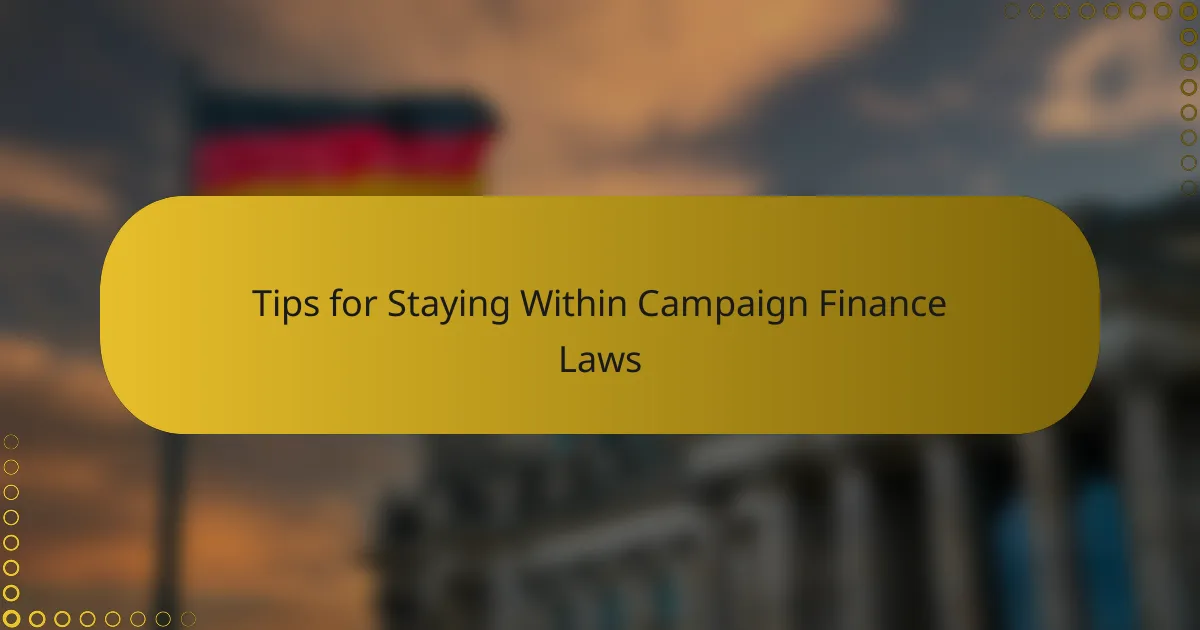
Tips for Staying Within Campaign Finance Laws
One tip that really stuck with me is to keep meticulous records from day one. I used to underestimate how a simple receipt or an email could become crucial evidence of compliance. How often do we overlook small details until they come back to bite us? Staying organized isn’t just a boring task—it’s the foundation of staying within the law.
Another lesson I learned the hard way is the importance of asking questions early and often. When I was unsure about a contribution’s legality, reaching out to a compliance expert saved me from potential headaches down the road. It’s tempting to just hope everything’s okay, but isn’t it better to be safe than sorry when dealing with rules this complex?
Finally, I can’t stress enough how vital it is to build a team that understands these laws inside out. I’ve seen campaigns stumble because they relied on a single person juggling too much, and mistakes happened. Having people who know the nuances means fewer surprises and more confidence that you’re playing by the book—which, in the end, protects not just the campaign but the candidate’s reputation too.
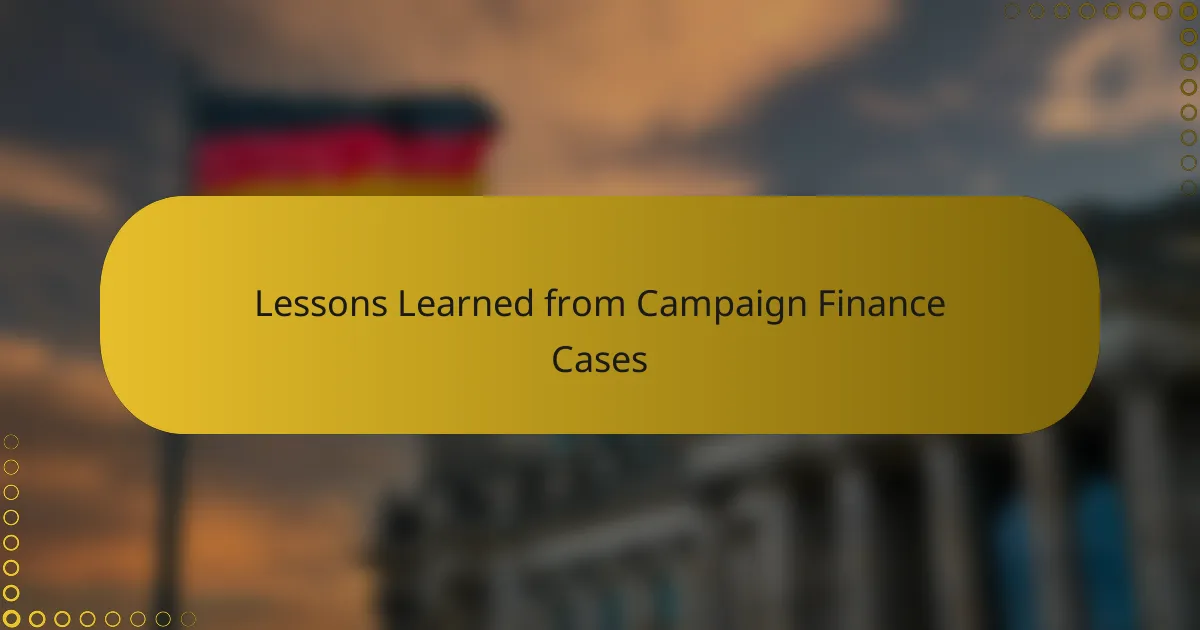
Lessons Learned from Campaign Finance Cases
One lesson that really hit me from reviewing campaign finance cases is how easily good intentions can get tangled in legal gray areas. I recall reading about candidates facing penalties not because they tried to cheat outright, but because they misunderstood subtle coordination rules. It made me wonder: how forgiving can the system afford to be when a single mistake might derail an entire campaign?
Another takeaway is how relentless enforcement can be—a double-edged sword, in my view. On one hand, it’s reassuring that watchdogs pursue violations to uphold fairness. On the other, I found myself sympathizing with smaller campaigns overwhelmed by endless paperwork and technicalities. Does this mean the system inadvertently favors those with deep pockets and legal teams ready to fight every challenge?
Finally, I’ve seen firsthand that loopholes constantly shift the landscape. Cases involving “dark money” or Super PAC coordination reveal that no matter how thorough the laws are, crafty actors push the boundaries relentlessly. It leaves me questioning: is true transparency ever achievable, or is it just a continuous race to plug holes faster than new ones appear?